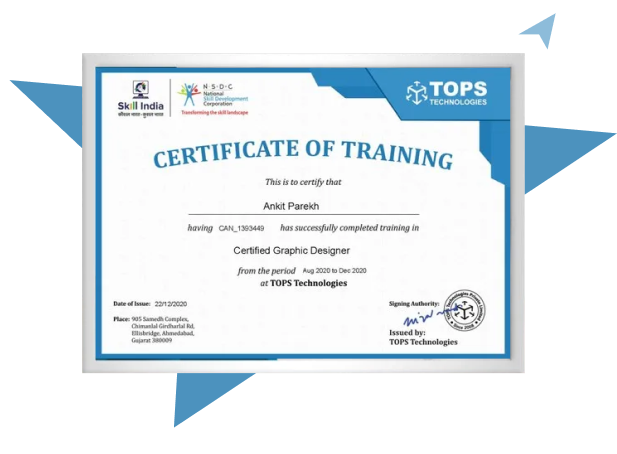Our Facts and Figures
1 Lac+
Student Placed
3000+
Companies TieUp
19+
Offices in India
50+
Industry Courses
Get 100% Job Assistance by enrolling in Certified Mobile Testing Training Course
Key Highlights
Limited Students Batch
Personalised Attention
Highly Qualified Teachers
Flexible Batch Timings
Interactive Learning
Live Projects
Career Support
Job Oriented Training
Mobile Testing Course Highlights
Pick up the best of Mobile Testing skills for that dream job you always wanted! TOPS Mobile Testing Course at Surat offers comprehensive learning with Database Testing, Manual and automated bug identification tactics, Security Testing, Automation Architect and Framework Development.
The involvement of students in the live project guarantees a perfect blend of theoretical and practical learning. Our Mobile Testing course caters to both – the working professionals looking to rejuvenate their career with by upgrading themselves and for the freshers looking for their first break in the IT industry.
The expert guidance at TOPS ensures that our students are well-equipped with the industry-specific knowledge, yielding the best jobs in a highly competitive market. TOPS have offered knowledge and placement assistance to over 10,000 students since its commencement. Most of the students are associated with IT giants, holding a respectable position.
It is about time to take a wise step towards your career by taking a risk-free, demo session at TOPS Technologies Surat Training center. Feel free to drop us an email at inquiry@tops-int.com or simply make a call on 7622011173 to inquire about the batch commencement, fees, curriculum, placements, etc.
Customized Mobile Testing Batch for students and professionals
TOPS Technologies are well-equipped to arrange a customized, Mobile Training Batch at your office or college in Surat.
40%
Average Salary Hike
4.5 Lacs
Highest Salary
3000+
Hiring Partners
Join Our Free Upcoming Webinar
Python with AI
21 Feb 2026, 10:30 AM
Trainer
Chintan Chovatiya
(Sr. Technical Trainer)
React JS with AI
21 Feb 2026, 02:00 PM
Trainer
Rinkal Adesara
(Sr. Technical Trainer)
Object Oriented Programming (OOPs)
21 Feb 2026, 04:00 PM
Trainer
Rinkal Adesara
(Sr. Technical Trainer)
Mobile Testing Course Curriculum
Download Curriculum- Introducation
- Introducation
Our TOPS Training Centers in India
Course Key Features
- Learn the Most Essential Skills to Kickstart your Mobile Testing Career
- Learn to Automate any apps in Andriod/IOS
Skills Covered
- Introduction to Mobile Testing
- Appium Installation
- Java concepts
- Understanding of Android Native Apps
- Automate Scripts
Job Roles
- Mobile Application Tester
- Automation Testing – Mobile
- Mobile Automation Tester
Get Training Certificate by Government
Recognized NSDC/Skill India

- National Skill Development Corporation
- Supported by the vision of PM Shri Narendra Modi
- Certification by NSDC SkillIndia
- Valid for all Jobs and College Training
- International Recognition

Student Reviews
Zubair Hashmi
Mobile TesterOverall, the Mobile Testing course at TOPS Technologies Surat provided clarity and confidence. It helped me un...
Read MoreTalha Baig
Mobile TesterThe Mobile Testing training at TOPS Technologies Surat helped improve my attention to detail. Testing gestures...
Read MoreNoman Farooqui
Mobile TesterInstead of focusing only on documentation, the course explained how users actually interact with mobile apps,...
Read MoreSaif Rizvi
Mobile TesterThe Mobile Testing sessions at TOPS Technologies Surat helped me gain confidence in testing both Android and i...
Read MoreSalman Ansari
Mobile TesterOne thing that stood out was understanding how user behavior affects mobile testing decisions. Small issues fe...
Read MoreArshad Mirza
Mobile TesterLearning Mobile Testing at TOPS Technologies Surat felt practical and hands-on. Working with sample mobile app...
Read MoreArshad Mirza
Mobile TesterThe trainer explained mobile testing concepts clearly, especially how performance and usability testing differ...
Read MoreDanish Parvez
Mobile TesterMobile Testing course ke baad samajh aaya ki mobile apps ko test karna web testing se kaafi different hota hai...
Read MoreMohammed Azeem
Mobile TesterWhat I liked about learning at TOPS Technologies Surat was the focus on real testing scenarios like app crashe...
Read MoreShruthi Salian
Mobile TesterBefore this course, mobile testing felt limited to basic checks. Learning about device fragmentation and OS va...
Read MoreAnanya Karkera
Mobile TesterThe Mobile Testing course at TOPS Technologies Surat helped me understand how mobile applications behave acros...
Read MoreRaksha Bhandary
Mobile TesterMobile Testing course ke baad samajh aaya ki mobile apps ko test karna web testing se kaafi different hota hai...
Read MoreFAQ
A test case is a set of conditions and steps used to verify a specific function or behavior in the mobile app. It includes expected results and is designed to ensure that features perform as intended.
Test scenarios are high-level test ideas that guide multiple test cases. For example, a scenario might be "verify login function," which includes cases for valid credentials, empty fields, and incorrect passwords.
Automation tools like Appium offer methods to take screenshots during test execution. Screenshots help in debugging, analyzing failures, and creating visual proof for reports.
Automation speeds up repetitive testing, ensures consistency, and supports continuous integration. It reduces human error, improves test coverage, and is especially useful for regression and performance tests.
Installation testing ensures the app installs correctly from the app store or via APK/IPA files. It checks disk space handling, version upgrades, installation failures, and uninstallation behavior.
Monkey testing involves random user inputs like clicks and gestures to check app stability. It’s used to discover unexpected crashes or issues without predefined test cases.
Frameworks like Appium with TestNG or JUnit provide structure to test scripts, manage test data, and generate reports. They help maintain and scale automation projects efficiently.
CI automates the process of building, testing, and integrating code changes. Tools like Jenkins or Bitrise run mobile test suites automatically upon code commits, helping to detect bugs early.
Mobile apps often use APIs to communicate with back-end services. API testing ensures data accuracy, response time, and secure data exchange using tools like Postman or RestAssured.
Permission testing ensures the app asks for and handles permissions properly, such as camera, location, or storage access. It checks both allowed and denied scenarios to validate behavior.
Interview Questions
Memory leak testing involves using tools like Android Profiler or Instruments (iOS) to monitor memory consumption over time. Testers simulate prolonged usage and background/foreground transitions to check if memory is properly released and reused, avoiding crashes and slowdowns.
Hybrid apps combine web and native components and are usually built using frameworks like Ionic or React Native. Testing them involves validating both web views and native features across devices. Automation tools like Appium are suitable for hybrid app testing.
Sandboxing isolates app data and code execution from other apps and the OS. Testing involves verifying whether the app accesses only its own data and doesn’t leak information. It's a crucial security mechanism on both Android and iOS platforms.
Framework selection depends on platform compatibility, language support, community, integration with CI/CD, and team expertise. Appium is chosen for cross-platform needs, while Espresso and XCUITest are ideal for Android and iOS respectively due to their speed and native support.
Mobile test environments include emulators, simulators, real devices, network conditions, and OS versions. Testers use device farms or cloud testing platforms for broader coverage, ensuring the app behaves correctly under various configurations and environments.
Usability testing involves observing real users as they interact with the app to assess ease of use, navigation, and overall experience. Feedback is gathered to identify pain points and improve UI/UX. Tools like Lookback or Maze can be used for remote usability testing.
OS fragmentation leads to many devices running different versions of Android or iOS, making consistent testing a challenge. Testers must validate compatibility across these variations to ensure stability, especially when using newer or deprecated OS-specific features.
Exploratory testing involves simultaneous learning, test design, and execution. It helps uncover unexpected issues not found by scripted tests. This approach is essential in mobile testing due to the wide variety of devices, features, and user interactions.
Testers check whether the app installs correctly, launches on first try, retains user data during updates, and functions post-update. Scenarios include clean installs, version upgrades, downgrades, and error handling during interrupted installations.
Testers simulate low-storage scenarios by filling up the device memory and checking if the app handles this gracefully. The app should show relevant warnings or limit features as needed, without crashing or corrupting user data.









